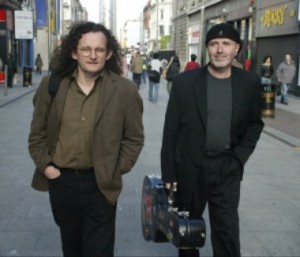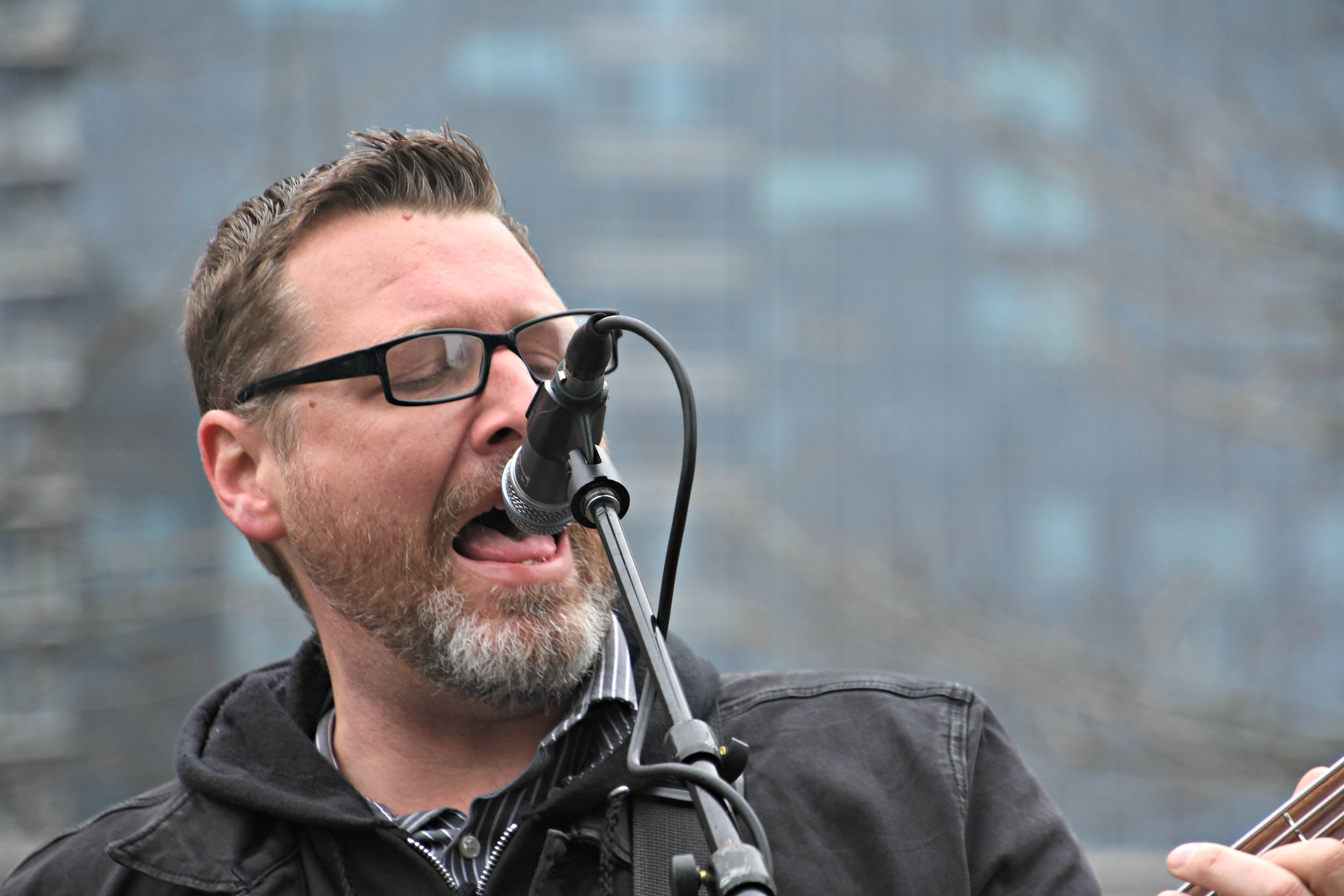“Welcome Here Again” is the name of the latest CD from fiddler Martin Hayes and guitarist Dennis Cahill, widely recognized as perhaps the greatest combination since chocolate and peanut butter.
Not only is it the title of one of the tunes in this collection of silky, melancholic, syncopated East Clare music, it’s an acknowledgment that these two have been away far too long. “It suggests that it’s been a long hiatus since our last recording and here we are, we’re back, we know it took forever, but there it is,” explains Hayes, of whom one Los Angeles Times critic wrote, “[he] has one of the most ravishing violin styles in all of Celtic music.”
But the title was hard to come by. “It’s really hard to think of titles for albums,” confesses Cahill, who grew up in County Clare but now lives in Connecticut. “They seem obvious when you hear them, but I’m really not too good at them. I can’t come up with anything smart to sign when I have to sign a birthday card with 20 other people, so I settle for ‘best wishes,’ and titles are not my strongest suit.”
But playing the fiddle is, and you can hear Hayes performing with his longtime musical partner, the Chicago-born Cahill, on Tuesday, February 17, at the World Café Live in Philadelphia, starting at 7:30 PM.
Born near Feakle—famous for its music festival–Martin Hayes grew up surrounded by some of the greatest musicians Clare has ever produced, including Paddy Canny, Martin Rochford, Francie Donellen and Martin Woods. His father, P.J. Hayes, was leader of the legendary Tulla Ceili Band, and Martin, who started playing at 7, was touring with them by the time he was 13. Before the age of 19, he’d won six all-Ireland fiddle championships and today is considered one of the most influential musicians to come out of Ireland in 50 years.
We caught up with Martin Hayes recently and, truth be told, asked him more than five questions.
When you came to the US in the 1980s after college, you played with a rock band rather than playing traditional music. Why was that?
I continued to play traditional music, but I didn’t do it professionally. I played in the sessions with people like Liz Carroll. I was getting by by playing for money in bars and I wasn’t doing much else. I got pretty tired of that eventually and ended up in an experimental electric band with Dennis. That was my real transition to America, hanging out with these musicians, experimenting with what we’d got and what we each would bring to the table. Obviously, I was going to bring Irish music to the table. But it was an electric band, and there’s something about hearing that all the time that makes you crave subtlety. I had come to the conclusion that it really wasn’t who I was and it was never where I was going to find my soul in music. I knew I definitely needed to come back and play traditional music like I knew it as a teenager. But that experience had its effect. Because of having played in that band, I saw music in different context, and when I was playing particular tunes from my locality, I came to appreciate it even more.
It was from that experience that you also found Dennis Cahill. Critics have described you two as “having a rare musical kinship.” It’s almost as if you were born to play together. To what do you owe that?
I would say it’s got to do with the fact that we know each other really well. We’ve talked about the music and tried to get on the same page with it. In all music-making, jazz, rock or whatever, when it happens well, when you have the proper space for making music, then you have that instant rapport where everything is obvious and everybody understand everybody else. It doesn’t happen all the time, but when it doesn’t we’re pretty close anyway.
The East Clare style is very distinctive—slow, emotional, and genteel, even the reels and jigs which were composed for dancing. Why do you think it developed that way?
It’s very difficult to come up with any reason for a particular style. What’s often discussed is landscape: When you have gentle landscape, you have gentle music. There’s the possibility of that. It’s a bit beyond our knowing. But every region and locality is influenced by particular individuals who’ve shaped people’s ideas about music. The important factors in the music of East Clare, and there are two standards: They were always looking for music with feeling, which often meant a little taint of sadness and melancholy–the same element you have in the Blues–and rhythmic pulse and dance. It wasn’t about playing super fast, it was about playing real swing. Count Basie played swing but he didn’t go that fast. The tempo allowed dancers to dance in a more ornamented kind of way.
To me, the East Clare style sounds a lot like the old-timey music of the U.S. Appalachian region. Is there some connection?
Yes, I think it’s comparable to old-timey music. It’s the effect of a simple melody repeated over and over till you’ve created a kind of mantra, almost its own form of hypnosis, that similarly is going on in old-time music. I think if you go farther back you’ll find a convergence. And there are different versions. Some of it will take you to Scandanavia, some to Scotland, and some directly to Ireland. When I was a teenager, I went on a local “safari” to the houses of the old guys, the old musicians, where I would hang out, talk to them, tape them, and get all these old tunes. Over the course of the 20th century, a lot of recordings came to Ireland and people began to copy these styles of these fiddle players till the only variances you found where when people failed to copy them precisely. But these were the fiddlers I admired who kept the unique sound of the locality, like Junior Crehan, people who played a whole repetoire before all those recordings were available and didn’t change. They had an incredible rustic simplicity, like old-timey music, so simple that you might not bother learning it, some people thought. Yet it’s incredibly hard to achieve from a compositional point of view, oozing with earthiness and common sense. There’s nothing pretentious about it. You can’t be pretentious and be an old-time player.
There are some who say they can hear a little bit of the jazz or even rock in yours and Dennis’s style. Is that deliberate, or just incidental to your background?
I listen to loads of things—jazz, baroque, world music—but I don’t take it and put it into my music, though it influences how I look at music overall. There are universal things that you learn from different forms of music. Stepping into other worlds helps you see your own.


